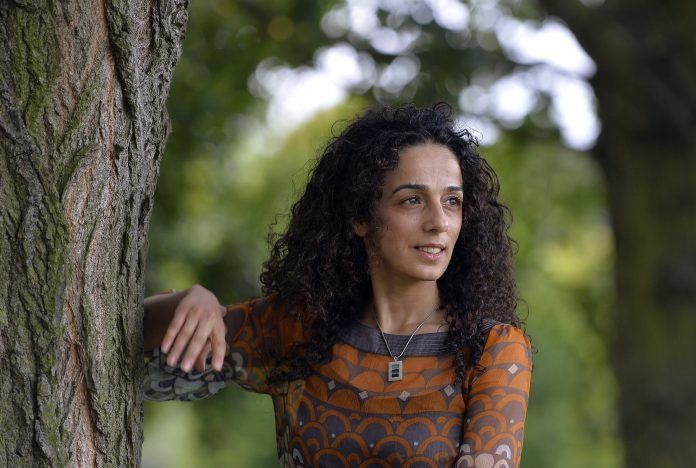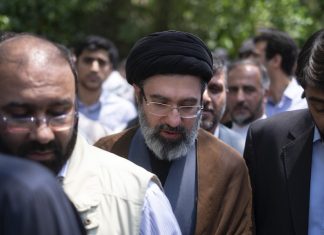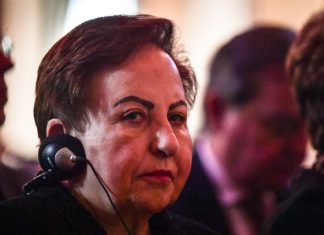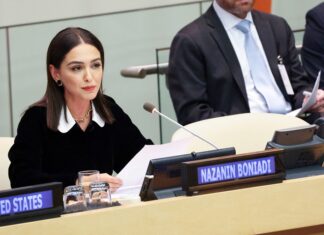Iran human rights campaigner and Nobel Peace Prize nominee Masih Alinejad revived her social media campaign “Let Us Talk” on Feb. 1 to raise awareness about women forced against their will to wear headscarves in Iran and Afghanistan.
Alinejad was announced as a Nobel Peace Prize nominee on Feb. 1 for advancing women’s rights in Iran.
Her campaign has coincided with “No Hijab Day” — founded by Alinejad — to highlight the plight of Iranian women who have been beaten, lashed and sent to prison for removing their headscarves in public. Iran requires girls as young as seven and all adult females to wear the hijab outside of the home. Women can be imprisoned, flogged or fined if they fail to cover their hair.
In Iran I was told if I don’t wear hijab, I get kicked out from school, I get jailed, lashes, beaten up, and kicked out from my country. In the West I’m told, sharing my story will cause Islamophobia.
I’m a woman from Middle East and I am scared of Islamic ideology. Let us talk. pic.twitter.com/SKQFh93M51— Masih Alinejad ?️ (@AlinejadMasih) December 28, 2021
Alinejad’s “No Hijab Day” falls on “World Hijab Day,” which encourages women of all backgrounds to wear a hijab in support of Muslim women who are targeted because of their faith. Alinejad told Kayhan Life that the “Let Us Talk” campaign was needed to ensure that women who felt oppressed by Islamic laws could speak out without being labelled anti-Muslim.
For this simple act of protest, for this peaceful protest, for dreaming to have a #NoHijabDay in Iran, in Afghanistan, for felling the wind in my hair, for giving voice to women who don’t have media in Iran, I receive daily death threats. Why? #LetUsTalk pic.twitter.com/pOT4BFp0kM — Masih Alinejad ?️ (@AlinejadMasih) January 31, 2022
“The ‘Let Us Talk’ campaign is a window into the Middle East. Everyone who cares about dignity and freedom, who cares about equality, should open this window and listen to the women of the Middle East, instead of saying their stories will cause Islamophobia,” Alinejad said.
Alinejad’s comment follows a Twitter row with US Congresswoman Ilhan Omar’s husband, Tim Mynett, who accused her of disliking Muslims.
1-In response to my @washingtonpost op-ed on how @IlhanMN‘s proposed legislation against Islamophobia could silence legitimate concerns about Islamist extremism, her husband defamed me using the same language used by Islamists as a pretext to repress their feminist critics pic.twitter.com/KJCnHUzWJa
— Masih Alinejad ?️ (@AlinejadMasih) January 29, 2022
در مصاحبه با اسکای نیوز: امیدوارم ایلهان عمر جرات مناظره با یکی از زنان ایران و یا افغانستان را داشته باشد تا بشنود لایحه اسلامهراسی او چه خطراتی برای زنان خاورمیانه دارد. مصاحبه با اسکای نیوز در مورد کمپین #LetUsTalk pic.twitter.com/8arZfckLLp — Masih Alinejad ?️ (@AlinejadMasih) February 2, 2022
The exchange followed a Washington Post opinion piece by Alinejad in which she raised concerns about Omar’s Islamophobia bill.
The bill — designed to tackle Islamophobia around the world — was passed on Dec. 15 and requires the US State Department to publish data on incidents of Islamophobia in its human rights reports.
Reacting to Alinejad’s opinion piece in a tweet on Jan. 26, Mynett said: “So this lady [Masih Alinejad] doesn’t want to combat Islamophobia because she doesn’t like Muslims. Understood!”
Responding to Mynett, Alinejad tweeted, “Though I wrote [in the piece], ‘I have many relatives who are pious Muslims I love & respect, including my beloved mother’— [Mynett] had the audacity to call me a self-hating Muslim.”
Alinejad raised concerns that the bill could stifle legitimate criticism of organizations such as the Taliban and regimes like Iran’s which discriminate against women.
Social media users took to Twitter to show their support for the Let Us Talk and No Hijab Day campaigns, sharing photos of themselves without a headscarf as well as video clips of pre-revolution films from Iran showing women with uncovered hair.
Several anti-hijab activists are in prison in Iran for peacefully protesting the country’s compulsory hijab law. Human rights activist Saba Kord Afshari is among those detained for her peaceful opposition of the law after she removed her headscarf during a Jan. 2018 protest. Afshari was sentenced to 24 years in prison. A video published by Afshari showed her without a head covering and expressing her support for Alinejad’s “White Wednesdays” campaign in which women wear white as a form of protest against Iran’s compulsory hijab legislation.
U.S. Senators Seek Sanctions on Iran Over Alleged Plot to Kidnap Journalist
“While women in the West are celebrating ‘World Hijab Day,’ five ‘White Wednesdays’ activists are in prison just because of simply protesting against compulsory hijab. So you cannot call yourself a feminist and celebrate something which has become a tool in the hands of Islamists to oppress women without giving them a voice,” Alinejad said. “I’ve never heard ‘World Hijab Day’ stand up for those women in Iran and Afghanistan who are being beaten up and receiving lashes for not wearing hijab.”
She has a message for World Hijab Day: “We don’t want hijab day, we want #NoHijabDay. Hijab is a weapon used to arrest women and throw them in jail. To punish them for no reason.”
Walking unveiled in Iran, women can get arrested, lashed and imprisoned. #LetUsTalk#FreeFromHijab pic.twitter.com/AG7J87UWT2— Masih Alinejad ?️ (@AlinejadMasih) January 31, 2022
The organizers of “World Hijab Day” did not respond to Kayhan Life’s request for comment about the use of compulsory hijab in Iran.






